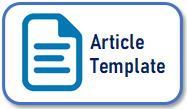Significance and Key Challenges in Conducting Stress Testing for Islamic Commercial Banks
DOI:
https://doi.org/10.14421/grieb.2013.012-01Keywords:
Islamic commercial banks (ICBs), Stress Testing, Financial Stability, IFSBAbstract
With the current cross-border growth in Islamic finance, Islamic commercial banks (ICBs) are looking forward to being perceived as an industry in the process of becoming mature. This would require the establishment of some basic infrastructure, including sophisticated risk management tools that enhance the soundness and resilience of the ICBS. This paper focuses on the latter that is the role and significance of stress testing as a risk management tool. The stress testing has become part of the regulatory and supervisory authorities within the financial stability analysis. The global financial crisis (2008) has placed the spotlight squarely on stress tests. Though, ICBs operate within the similar financial environment, and their balance sheet composition, however, calls for different treatment in stress testing. Apart from the specificities of ICBs, there are key issues and challenges that should be given due considerations in developing an appropriate stress testing regime. This paper explores key specificities and challenges. The paper argues that in the beginning, conducting the stress testing may not appear a simple task for the ICBs. However, a proper consideration to the challenges identified in the paper would certainly tend to improve the overall effectiveness and credibility of the stress testing programmes.References
Alfaro, R and M Drehmann, 2009. Macro stress tests and crises: what can we learn? BIS Quarterly Review, December, pp 2941.
Basel Committee for Banking Supervision, 2009. Principles for Sound Stress Testing Practices and Supervision, Basel, http://www.bis.org.
Basel Committee for Banking Supervision (January 2013). Basel III: TheLiquidity Coverage Ratio and Liquidity Risk Monitoring Tools, Basel, http://www.bis.org.
Borio C, Drehmann M and Tsatsaronis, 2012. Stress-testing macro stress testing: does it live up to expectation. Monetary and Economic Department, BIS working paper no. 369.
Buncic D and Melecky M., 2011. Macro-prudential Stress Testing of Credit Risk: A Practical Approach for Policy Maker. School of Economics and Political Science, Department of Economics, University of St. Gallen, Discussion Paper no. 2011-39.
Cihak M., 2004a. Designing Stress Tests for the Czech Banking System. CNB Internal Research and Policy Note /3/.
Cihak M., 2004b. Stress testing: A review of key concepts. Czech National Bank, Internal Research and Policy Note no. 2/2004.
Committee for European Banking Supervisors, 2010. Guidelines on Stress Testing. United Kingdom, http://www.eba.europa.eu.
Hoggarth G, Sorensen S, Zicchino L., 2005. Stress tests of UK banks using a VAR approach. Bank of England, working paper No. 282.
Islamic Financial Services Board (December 2005). IFSB-1: Guiding Principles on Risk Management for Institutions (Other Than Insurance Institutions) Offering Only Islamic Financial Services. Kuala Lumpur, Malaysia, http://www.ifsb.org.
Islamic Financial Services Board (December 2006). IFSB-3: Guiding Principles on Corporate Governance for Institutions Offering Only Islamic Financial Services (Excluding Islamic Insurance (Tak?ful) Institutions and Islamic Mutual Funds). Kuala Lumpur, Malaysia, http://www.ifsb.org.
Islamic Financial Services Board (December 2010). IFSB GN-4: Guidance Note in Connection with the IFSB Capital Adequacy Standards: The Determination of Alpha in the Capital Adequacy Ratio. Kuala Lumpur, Malaysia, http://www.ifsb.org.
Islamic Financial Services Board (December 2010). IFSB-10: Guiding Principles on Shar?ah Governance Systems for Institutions offering Islamic Financial Services. Kuala Lumpur, Malaysia, http://www.ifsb.org.
Islamic Financial Services Board (March 2012). IFSB-13: Guiding Principles on Stress Testing For Institutions Offering Only Islamic Financial Services (Excluding Islamic Insurance (Tak?ful) Institutions and Islamic Collective Investment Schemes).
Islamic Financial Services Board (December 2013). IFSB-15: Revised Capital Adequacy Standard for Institutions (Other Than Insurance Institutions) Offering Only Islamic Financial Services. Kuala Lumpur, Malaysia, http://www.ifsb.org.
Islamic Financial Services Board (May 2013). Islamic Financial Services Industry Stability Report, Kuala Lumpur, Malaysia, http://www.ifsb.org.
Jones M., Hilbers P and G Slack, 2004. Stress Testing Financial Systems: What to Do When the Governor Calls", IMF Working Paper no.127.
Otani A , Shiratsuka S , Tsurui R , Yamada T., 2009. Macro Stress-Testing on Loan Portfolio of Japanese Banks. Bank of Japan working paper series, No.09-E-1.
Rouabah A, Theal J., 2010. Stress testing: the impact of shocks on the capital needs of the Luxembourg banking sector. Working paper No.47.
Sorge, M., 2004. Stress-testing financial systems: an overview of current methodologies. Bank for International Settlement, Monetary and Economic Department, IMF Working Paper no. 165.
Vazquez, F, Tabak, B, M and Souto M., 2010. Macro Stress Test Model of Credit Risk for the Brazilian Banking Sector. Central Bank of Brazil, Working Paper Series 226.
Downloads
Published
Issue
Section
License
Global Review of Islamic Economics and Business is licensed under a
Creative Commons Attribution-ShareAlike 4.0 International License



















